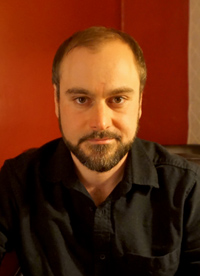The Blurring of Physical Realms:
Jess Taylor in Conversation
with J. R. McConvey

Malahat volunteer Jess Taylor recently spoke with J. R. McConvey about his fiction story, "Home Range," which won the Malahat's 2016 Jack Hodgins Founders' Award for Fiction, as chosen by judge Marina Endicott. The story was originally published in Issue 192, Autumn 2015.
"Home Range" starts out as a realist short story and continues like this until the ending, where both story and character are transformed into something more fantastical. Can you tell us a bit about the ending of your story (without giving it away) and the idea of metamorphosis there? Would you characterize it as a transformation or just as a reveal?
The ending came last—it didn’t occur to me to take the story in that direction until the revision stage. I don’t think of it as a physical transformation, nor as a reveal, at least not of something that was there all along. It’s more like a breach: a moment in which Kyle’s reality is changing fundamentally, which creates the conditions for a kind of blurring between psychological and physical realms. It could serve as a justification, or a rebuke or curse. It’s up for Kyle, and the reader, to decide.
Your dialogue both sounds particular to place and character and totally natural and believable. Do the voices of characters come to you early in the process? Do you use conversation journaling or any specific tools to hone the voices of your characters?
For me, the voices of characters usually emerge in the writing, along with their worldview, with the two qualities shaping each other in tandem. I don’t use conversation journals (although it’s a good idea) but I have done writing for both newspapers and documentaries, and I tend to transcribe interviews in full, with all the tics and pauses, which has maybe helped me appreciate some of the natural rhythms of spoken language. I have no idea if people in New Jersey would speak like this, though—I’m probably missing all kinds of great local slang.
Several of your characters—I'm thinking of your protagonists in "Home Range," "The Black Sands of Samyang," and "Little Flags"—have gone through the death of a loved one and are still holding onto the grief. What draws you to writing about characters that are still mourning?
I think that, in adulthood, encounters with children and death are the two commonly experienced seismic forces in life, the ones that can completely change your frame of reference for basic things, like your moral compass or your relationship with time. (There are others, of course—encounters with certain kinds of nature can do it—but they’re less universal.) That’s probably why I’m drawn to grief as a device: it allows you to see into the deepest parts of a character, the ones that function on levels far below the everyday, but that can affect every detail of a life.
In "Home Range," Kyle discovering a girl being trafficked in a shipping container sets the story in motion. In "Little Flags," the protagonist is obsessed with illegal immigration and fanatic in his racist attitudes toward Mexican people. How does the way people exploit each other and treat other people with cruelty factor into your writing? In "Home Range" Kyle has a raw humanity that other characters, like Szandor Zabados, the head of the local ILA chapter, seem incapable of. Is it important to you to set up this comparison?
Cruelty is something we encounter every day in the news, which we all absorb as a kind of ambient fog. Part of how I process it is to use it as material—Earl Sampson from "Little Flags," for instance, is closely based on a real guy. I’m fascinated by how power exploits cruelty to generate worship, or fealty, and the different shapes that exploitation takes. For me, a lot of it boils down to language—how certain power dynamics rely on obfuscation or confusion to create structures of control. I think a lot of being compassionate and human is about trying to see through those, whether in opposition or in empathy. In "Home Range," Kyle is ultimately trying to do the best he can for the girl, measured against what it means for his daughter, which in part means living with the structures his situation imposes on him, so that his daughter may not have to.
In both "Home Range" and a story published on Joyland Magazine, "Neutral Buoyancy," your characters seems to fall in mundane patterns of life, almost finding their contentment in the repetitive. In both stories, the protagonists need to make a choice between their rituals and normalcy and a greater sense of moral decency when perilous occurrences are thrust into their lives. What fascinates you about people and their rituals, their daily routines?
It’s related to the answer about grief. I think what fascinates me about routines is how precarious they are. Many of us (me, anyway) tend to typically go about unconsciously behaving as though the general, big-picture ways that we live are the only possible ways, or to think about change in finite terms, like "What if I lived somewhere else?" or "What if I had a new job"? But it’s possible for all those built-up routines we take with us from place to place to completely collapse, sometimes in an instant, which can destroy a sense of self, but also open up new ways of thinking about the world and one’s place in it. Which can, in turn, be terrifying. So I guess routines are interesting to me as the gatekeepers of a tenuous normalcy, a kind of ritual fortress against a meltdown that’s always theoretically present just beyond the next bowl of oatmeal.
You have multiple creative outlets as a fiction writer and documentary producer for film and television. You also write poetry and pieces of journalism occasionally. Do you find that your work in these different forms comes from the same impulse or does each provide something distinct for you? Do they feed on each other?
There’s definitely bleed between the different kinds of work. Different forms teach you different things—writing documentaries for television, for example, offers great lessons in synthesis and efficiency. But there are common values I try and adhere to, or themes I like exploring, in whatever work I do. The value of imagination is an overarching concern—not just as an engine for delight, but also as a sap that feeds our ability to see past our present selves. Not to get apocalyptic, but I suspect humankind will only survive in the long term if we can find ways to radically reimagine what we can be, and how we exist in relation to the planet. That’s going to mean intensive training in some pretty weird kinds of thinking.

Jess Taylor
* * * * * * * *









